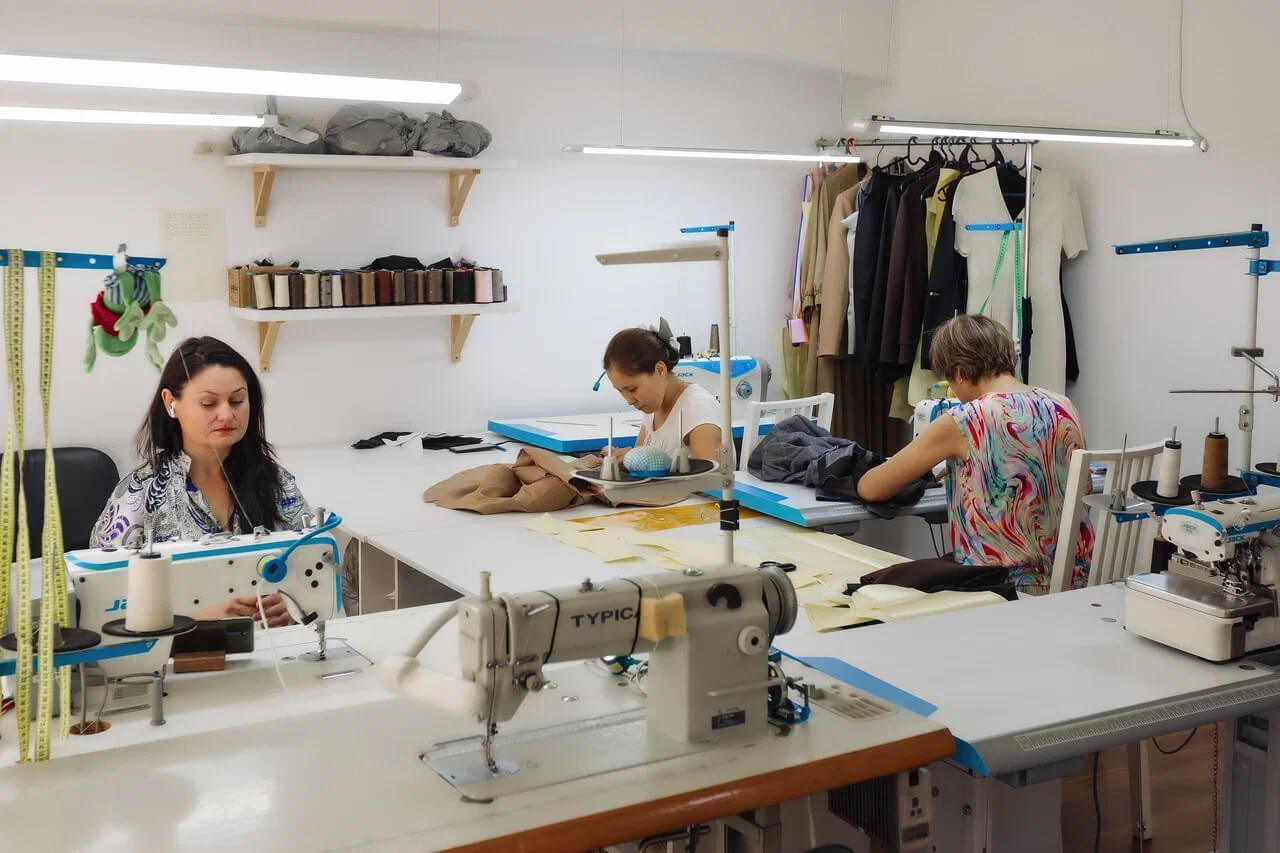To launch manufacturing, without understanding a thing about it. To promote a clothing brand in Kazakhstan, which is not the most favorable environment for the light industry. To survive a pandemic when your stores are closed for six months. These were some of the challenges the founders of Hey Baby! brand Aliya Akhmetova and Inna Filipovich endured.
Hey Baby! produces business attire for women living in a big city. There are two stores: in Almaty and Astana, the capital of Kazakhstan. The current annual turnover of the company is 400 million tenge (730 lakh rupees).
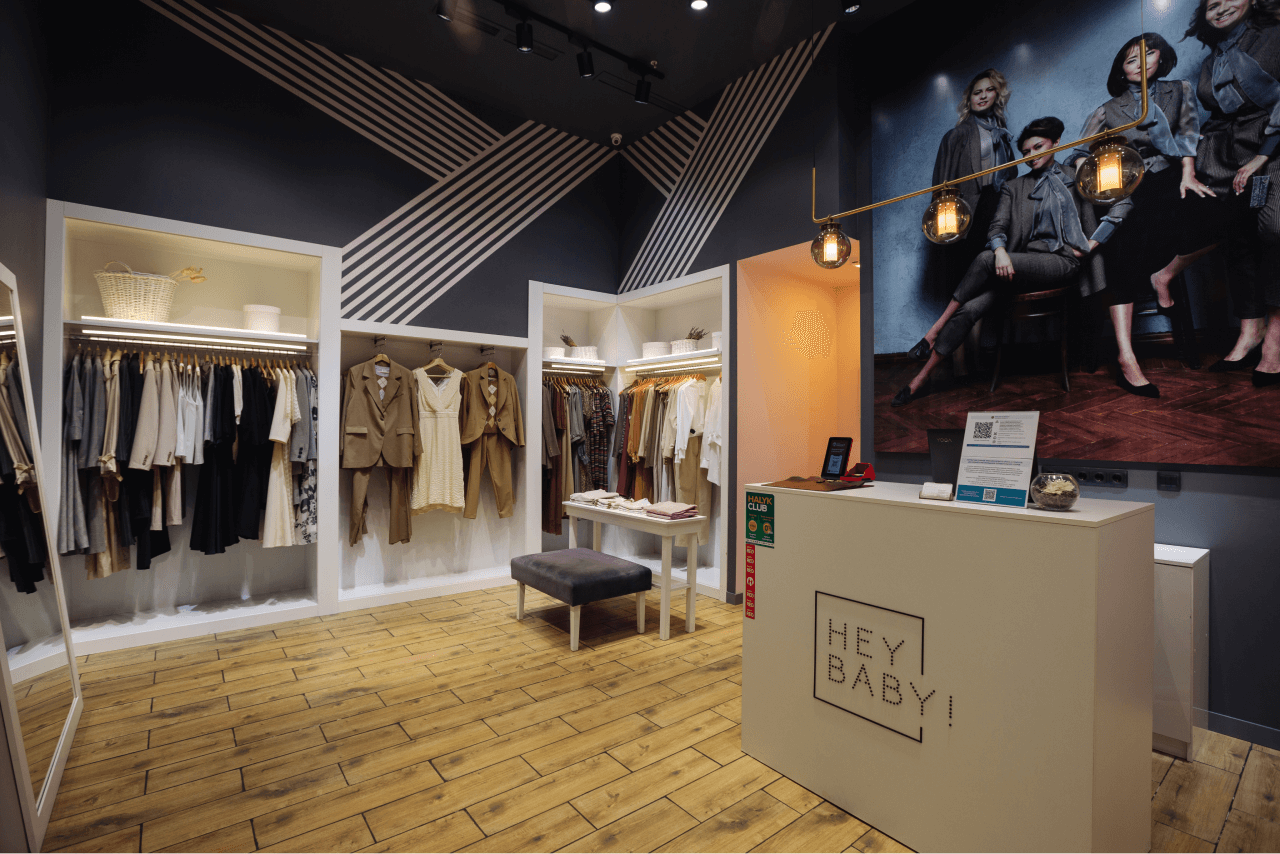
Aliya and Inna studied at the same school and then at the same university, both graduated from the Faculty of Economics of Moscow State University. Each of them had a successful career. Aliya was head of the commercial unit at a telecom company, and Inna, who had also studied in the United States, worked at the analytical center under the government of Kazakhstan.
Sales on the Move, Fitting in the Restroom, and Warehouse in the Apartment
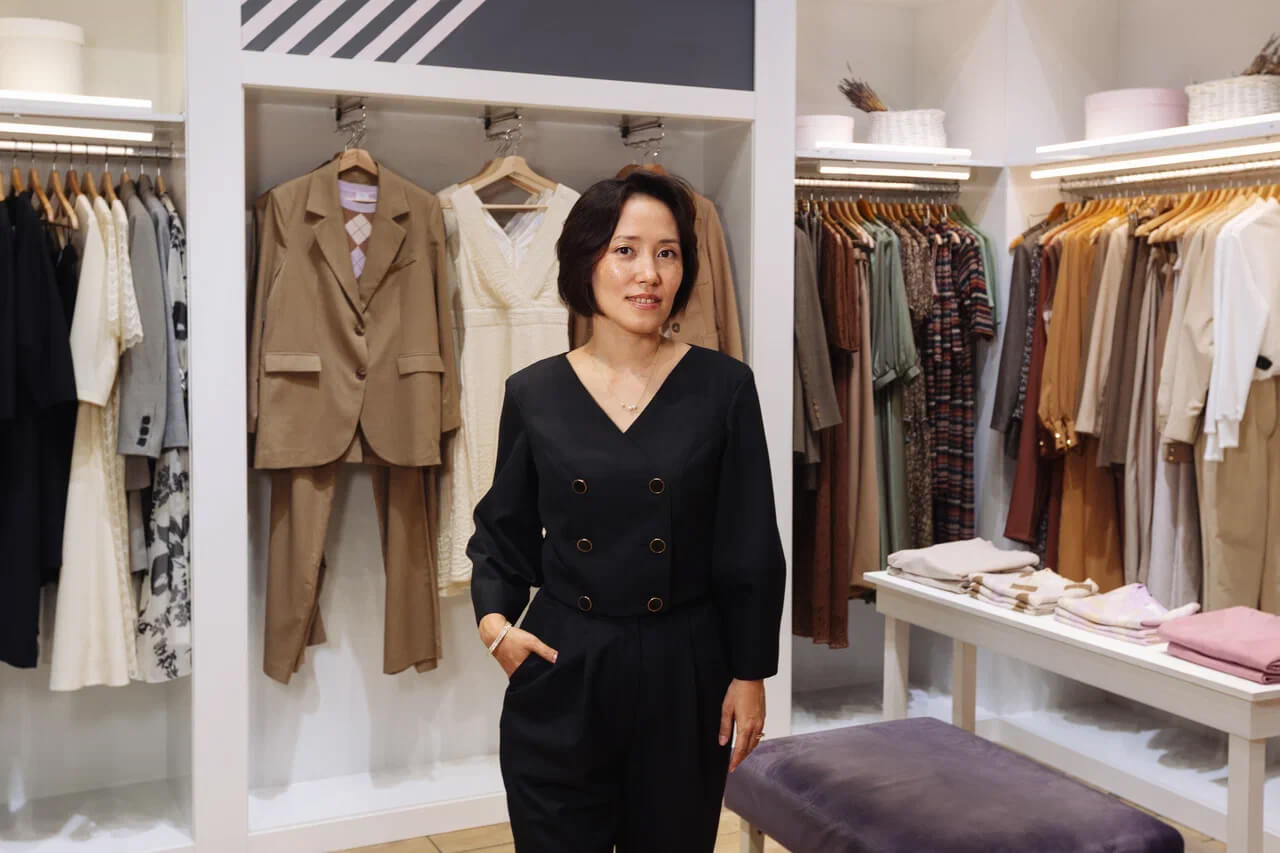
Aliya Akhmetova: It took me a long time to choose a proper job. It was important for me to create something, so the work in the bank did not work out, but I liked the telecom industry. I watched Astana grow from a wasteland to a megapolis with shopping and office centers that need telephony and the Internet.
Once on maternity leave, I realized that I could not return to my former place of work, as I would compete with my husband. It turned out that we made appointments with the same clients and offered them the same services from different companies.
I quit my job and decided to create something of my own. My first attempt was in retail. I opened two minimarkets and encountered all the «charms» of this business: a small range of goods, theft, and staffing problems. I had to close the stores.
In 2014, Russian clothing brands emerged and were booming. I was inspired by the notion that a product can be born from an idea, then come to life and bring emotions to the audience.
I sewed the first 10 skirts using all the money I had — $200. I sold the skirts to the same people to whom I had previously sold telecom services.
Sometimes I would come to the office with a huge package, and the employees would try on the skirts in the restroom. I used to drive 200 km a day. I was delivering, receiving, and placing orders.
The first photo shoots were done at my home by amateur photographers with a sheet and foil as a background and reflector, and my friends acted as models. The role of the advertising channel was word of mouth and my page on social media.
At first, a warehouse was located in my apartment, but then I rented a room of 15 square meters, which was also a showroom. At that time I sewed very small batches, one-off pieces. I could have taken out a loan and tried to take off, but I proceeded slowly and cautiously. I sewed 10 skirts, then 20, then 30, and so on.
In 2015, I rented a room in co-working. There I came across my ex-classmate Marina, our current art director. At that time she was trying to become a stylist. Together, we decided to do 20 must-haves (total looks) from the stylist. We did a photo shoot with a professional model and posted it on social media.
Social media had become tremendously popular in Kazakhstan by that time. So, the audience stumbled upon our photo shoot, and plenty of people accepted the ready-to-use total looks warmly and wanted to buy them.
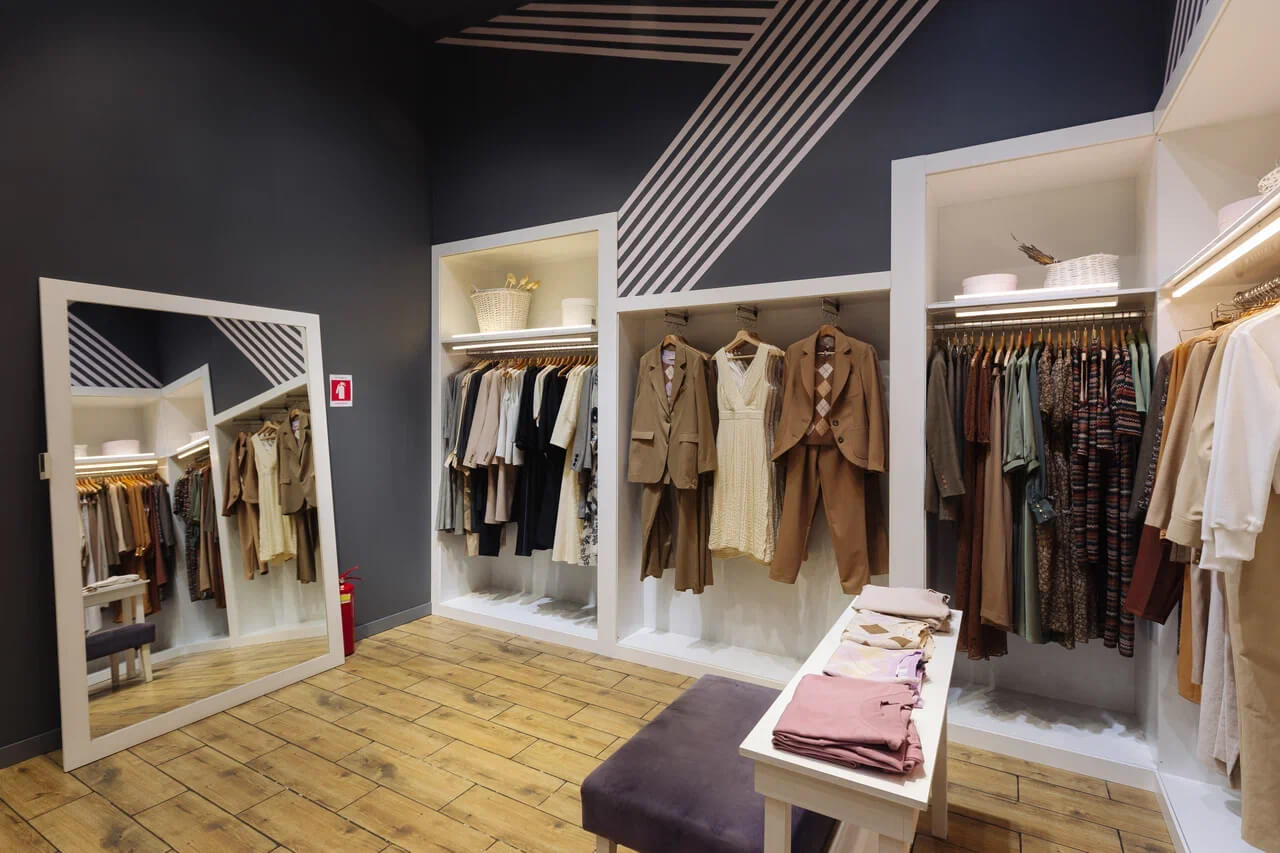
At the same time, a boom for local designers begins, and «Support Kazakhstan» program is launched. Kazakhstan became the host country for the international exhibition Expo 2017, and this was announced in 2014 by TV presenter Asel Kozhakova, who put on our crimson blazer, and she did it for a reason. An interview with her wearing our blazer was shown on every TV channel in the country. People started talking about us.
In 2015 it became obvious that it was time to move to another level, which required managerial skills and extra hands and minds. And Inna joined our team.
Impostor Syndrome and Pregnancy as a Start for Business
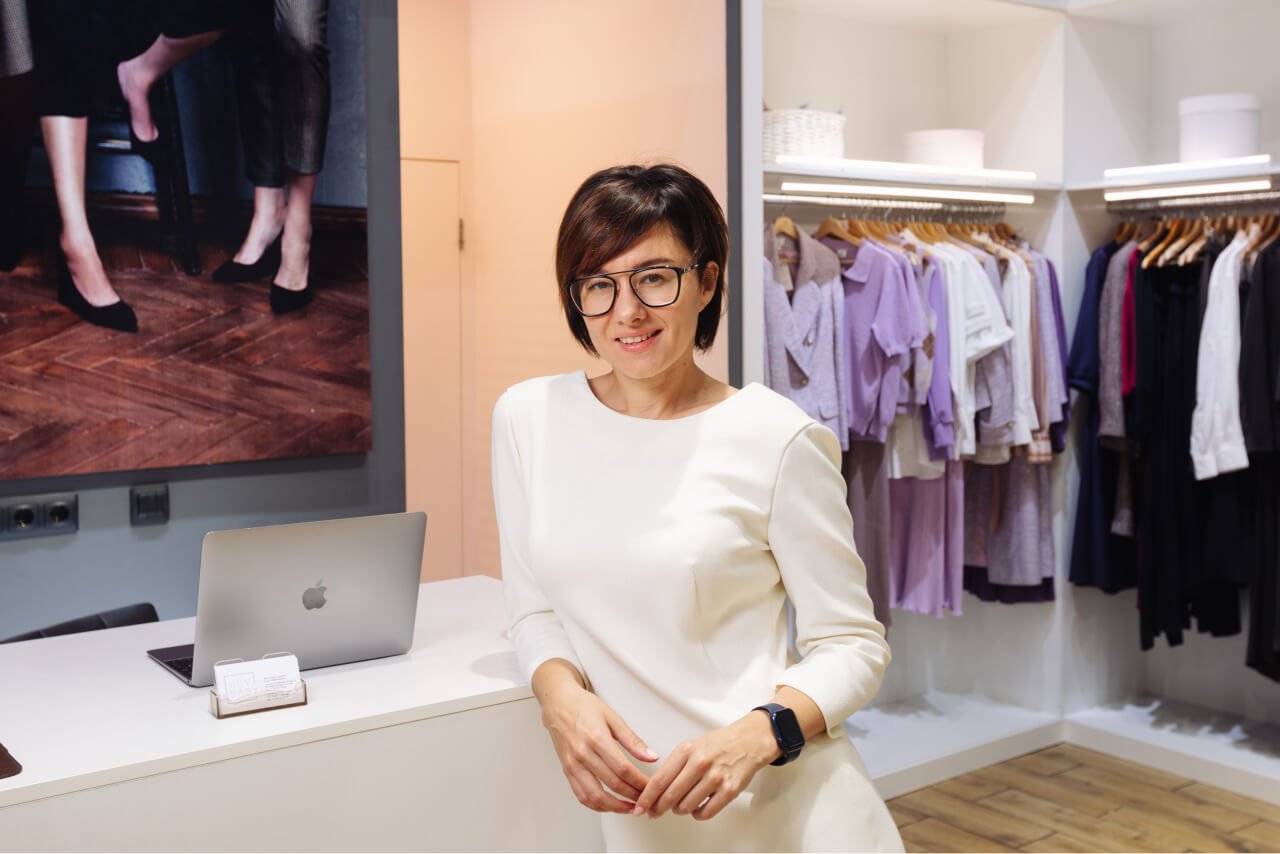
Inna Filipovich: After Moscow State University, I continued my studies in the USA and graduated from two master’s programs. I returned to Kazakhstan and worked here in serious positions in government. But the higher salary & position I got, the more I was tormented by the impostor syndrome. Was my work really necessary? Was I useful to anyone? I did not see the results of my work. We prepared huge reports, but had anyone ever read them?
At the same time, my life consisted of lectures and meetings with ministers. For example, I was able to meet many Nobel laureates who were invited to Kazakhstan. I even dined with John Nash. And then Aliya invited me to act as a model, putting her skirts and jackets on me.
Some photo shoots for Aliya happened during my lunch break, but even though I stayed hungry, I got great pleasure from posing in front of the camera. Wasn’t that weird?! How so?! I mean, I have higher education and a serious career, but I like being photographed more.
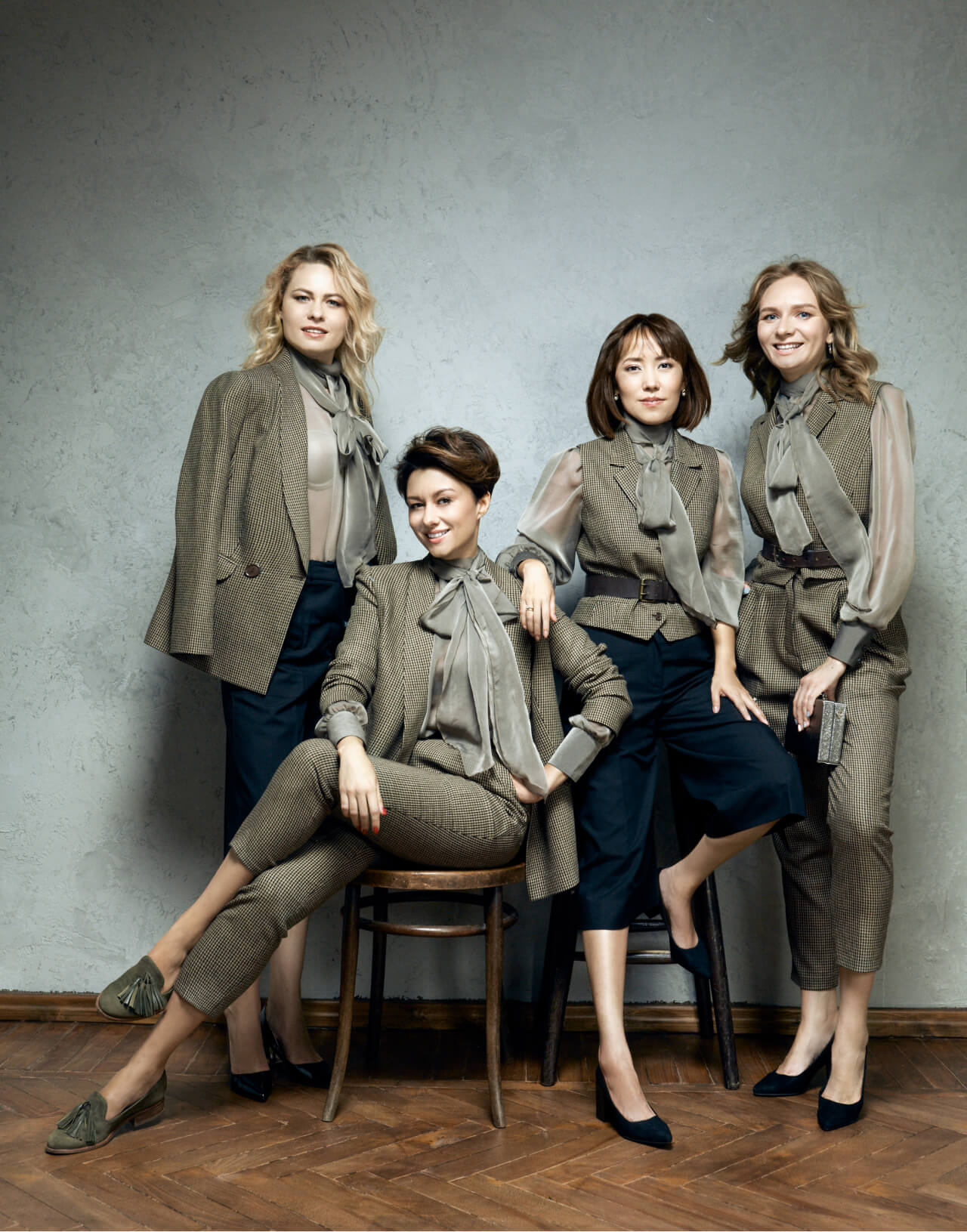
And then… Aliya showed me a two-strip pregnancy test and told me she had plans to launch a small capsule collection.
I quit my job in the fall of 2015 to help Aliya with her business and later planned to update my resume and look for a new job. However, I still haven’t updated my resume.
A Vacant Niche to Take — Stylish Business Attire for Busy Women
Kazakhstan has a resource-based economy with an emphasis on raw materials. The light industry has never been developed here. Aliya and Inna started growing their brand in Astana, where 70% of the population works in the public sector, in contrast to Almaty, which is considered the business capital.
Hey Baby! brand is designed for women living in big cities who need to go to work while having a family and personal affairs. Brand suits and dresses allow one to be beautiful, and at the same time it is comfortable, original, and not pretentious. «Non-boring elegance» is the slogan of the brand.
Inna: We decided that our brand would help to solve the problem of a clothing shortage for Kazakh women. At governmental meetings, I used to attend there were 20 men and two women and both wore the same blouses. There was no stylish business attire for Astana residents.
Aliya: We used a scientific approach when designing clothes, taking into account the peculiarities of a Kazakh consumer: their color type, and figure features. That helped us choose fabrics and styles wisely.
Сollections of Zara, Mango, or other mass-market brands are imported to the entire macroregion. But what is good for the Slavic type of appearance, could be destructive for the Kazakh women. Our competitive advantage is that we meet the demands of a target audience. We know the necessities of women and are aware of how to emphasize the advantages and hide the flaws of the figure. That’s how our approach helped us stand out in the market. The audience noticed us and recommended to their friends.
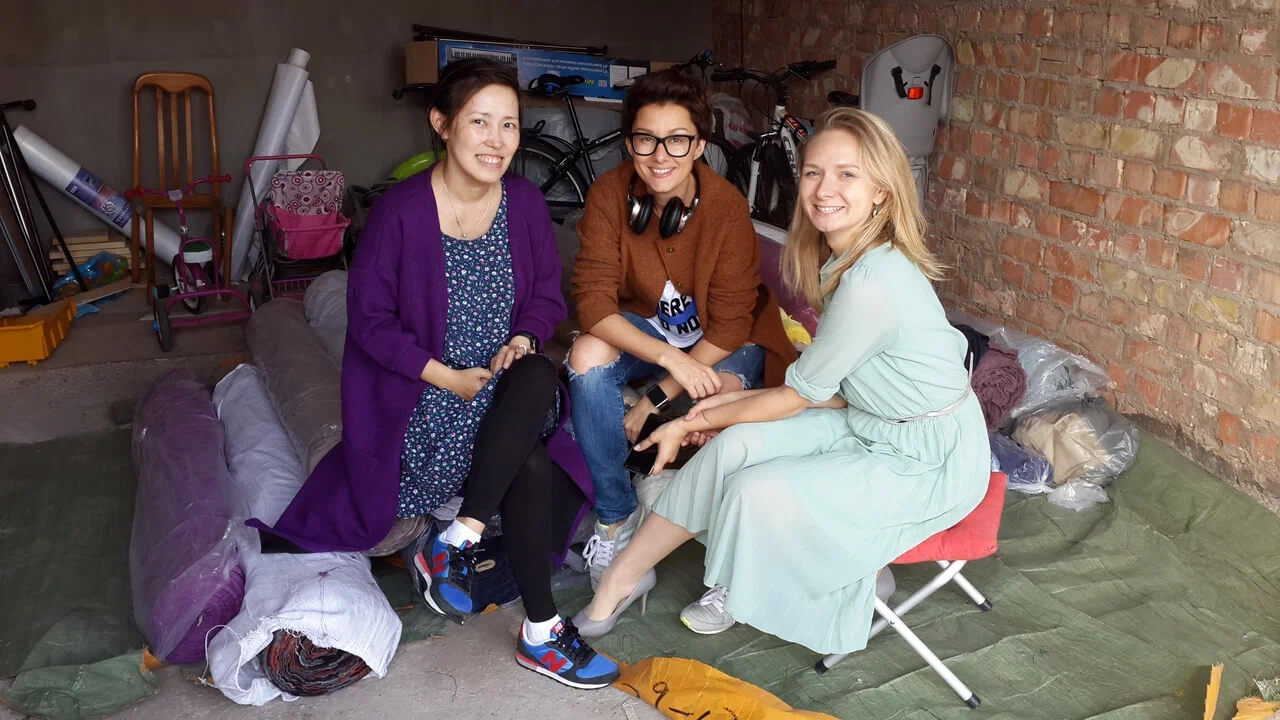
A 35 Lakh Rupees Loan to Open a Small Workshop in Almaty
Aliya: When we bought fabrics, the question arose who would sew clothing. In Astana, we couldn’t find a suitable production facility. Inna went to Almaty and hired a designer there.
We opened a production in which we understood nothing, in a town where we knew no one and had never lived.
We took their first loan of 20 million tenge (35 lakh rupees) to open a small workshop in Almaty. In Kazakhstan, there is DAMU Entrepreneurship Support Fund, which subsidized 6% of the loan out of 14%.
We bought fabrics for the collections in China, the UAE, and Turkey. We sought the best options in terms of quality and price that would let us sell in small quantities. We launched two showrooms in Almaty and Astana. Sales were growing.
We traveled around the country to showcase our collection, participated in regional designer exhibitions, and introduced our brand to people. It sounds nice, but in fact, it was a shuttle business: two overweight suitcases, and constant flights. Experienced designers turned up their noses at the sight of our clothes, and we were contemptuously called homegrown.
Inna: From the outset, we positioned ourselves as a commercial project aimed at mass production. Our clothing items are put on every day, they are not something you hang in your closet to wear once. We don’t have one-offs, it’s not haute couture.
Aliya: Anyway, we left these exhibitions with empty suitcases.
Inna: Indeed! And we began to feel like real entrepreneurs. We gave up the sole proprietorship and registered a Limited Liability Partnership (LLP) with a pink seal. Well, it’s just that Aliya was eight months pregnant, and the hormones were taking their toll.
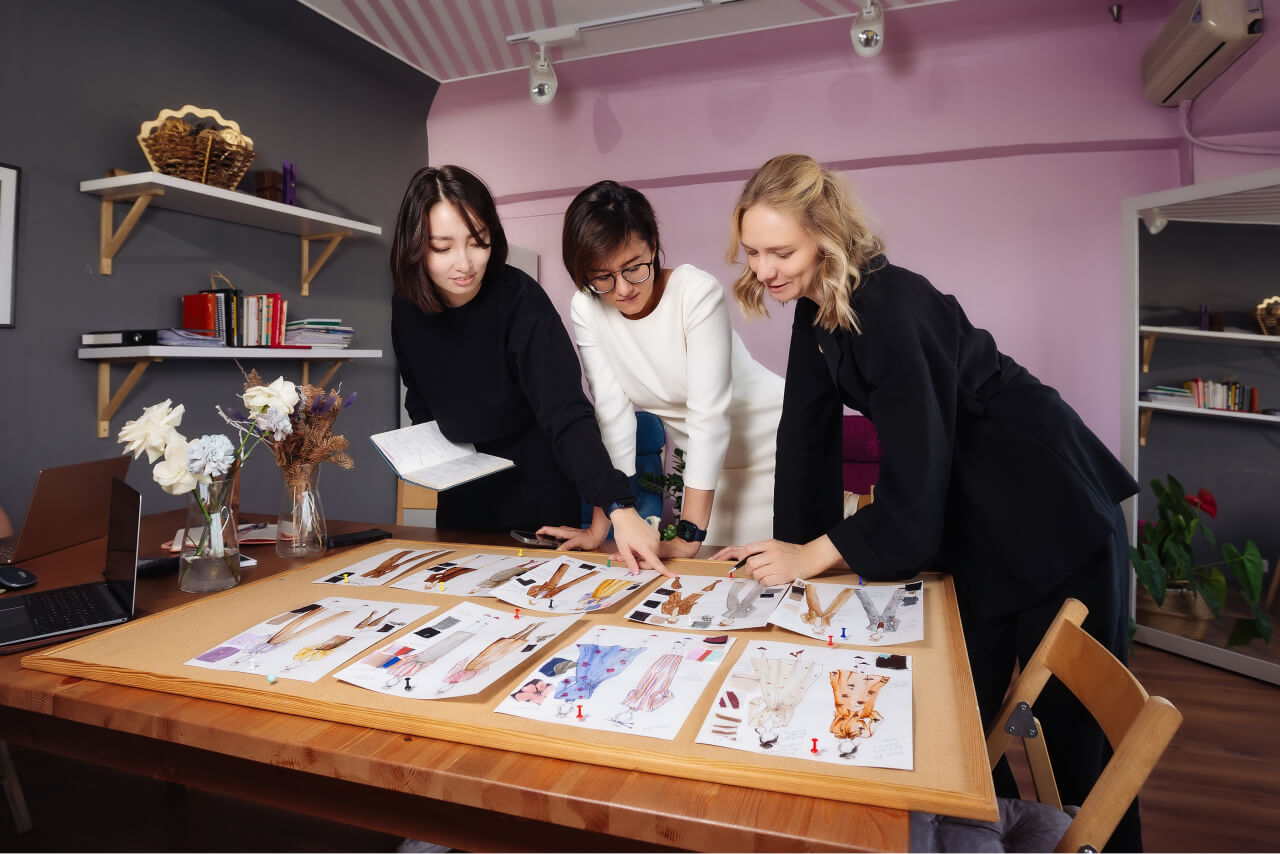
Kladana — Painful Rejection of Excel and the Transition to a Serious Level of Business
Inna: Along with the opening of a legal entity, Kladana came into the life of the brand. It happened this way: we were tallying up sales in an Excel spreadsheet. Aliya’s husband saw this picture, got horrified, and paid for our first account in Kladana. But the brain is lazy, it resists, it doesn’t want to learn something new, to strain itself.
In Excel we wrote «Moonlight, Favorite» — everything was clear to us. In Kladana we needed to formalize all the goods, that is to give them universal names, to divide them into types and groups. And this was unusual and scary.
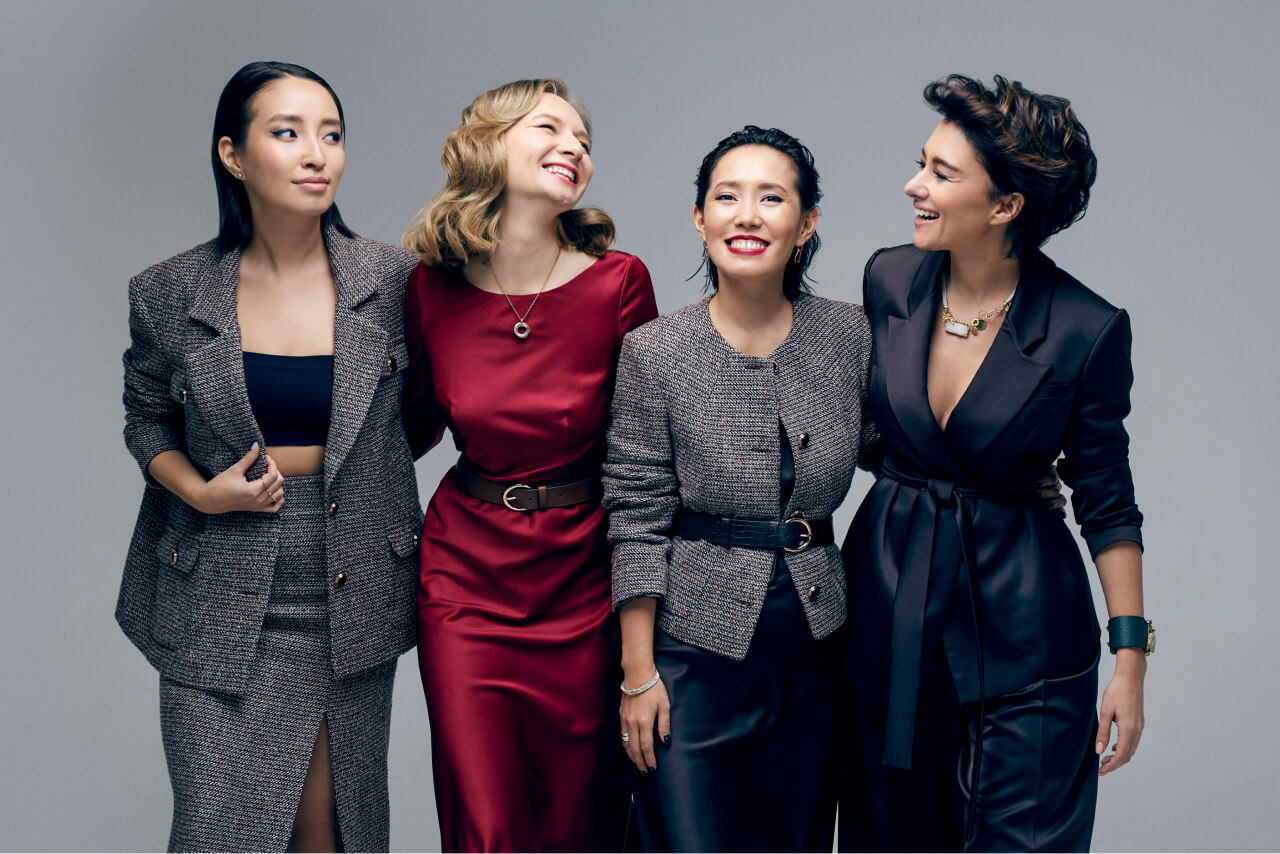
Also, all clients were recorded in the cell phone contact list, and we had to transfer them to the database in Kladana. And it seemed like we had a close connection with customers while registering them on the phone, and a distant connection with Kladana as an intermediary.
In fact, the transition from Excel to Kladana is a transfer to another level of business, a more serious one. This process gave us pain, fears, and struggles.
Aliya: But Kladana is really convenient. A customer comes in, and you look them up solidly in the database, see their purchase history, and ask them how they liked the dress they bought last month. The customer base pushed us to create a loyalty program. As we came up with it five years ago, we still have it working with the help of Kladana.
Would you like to get similar results?
Turnover Increased from 145 Lakh Rupees up to 260 Lakh Rupees in a Year
It is difficult to find good fabrics for a brand that does not produce clothing in large batches.
In the fall of 2017, Inna and Aliya switched to the Turkish fabric market and are still working with it. They found a supplier who worked with big international companies like Zara, Mango, Massimo Dutti, but was also willing to sell a few fabric rolls for small productions.
Aliya: We moved from the showroom to the mall. It’s a huge stress when your rent goes up 5 times and you still have to pay for several months at a time. I had to borrow money from a friend.
We started selling Hey Baby! apparel in MEGA mall in Astana, in a showroom in Almaty, and on Lamoda (widespread marketplace). Five seamstresses couldn’t keep up with the increased demand.
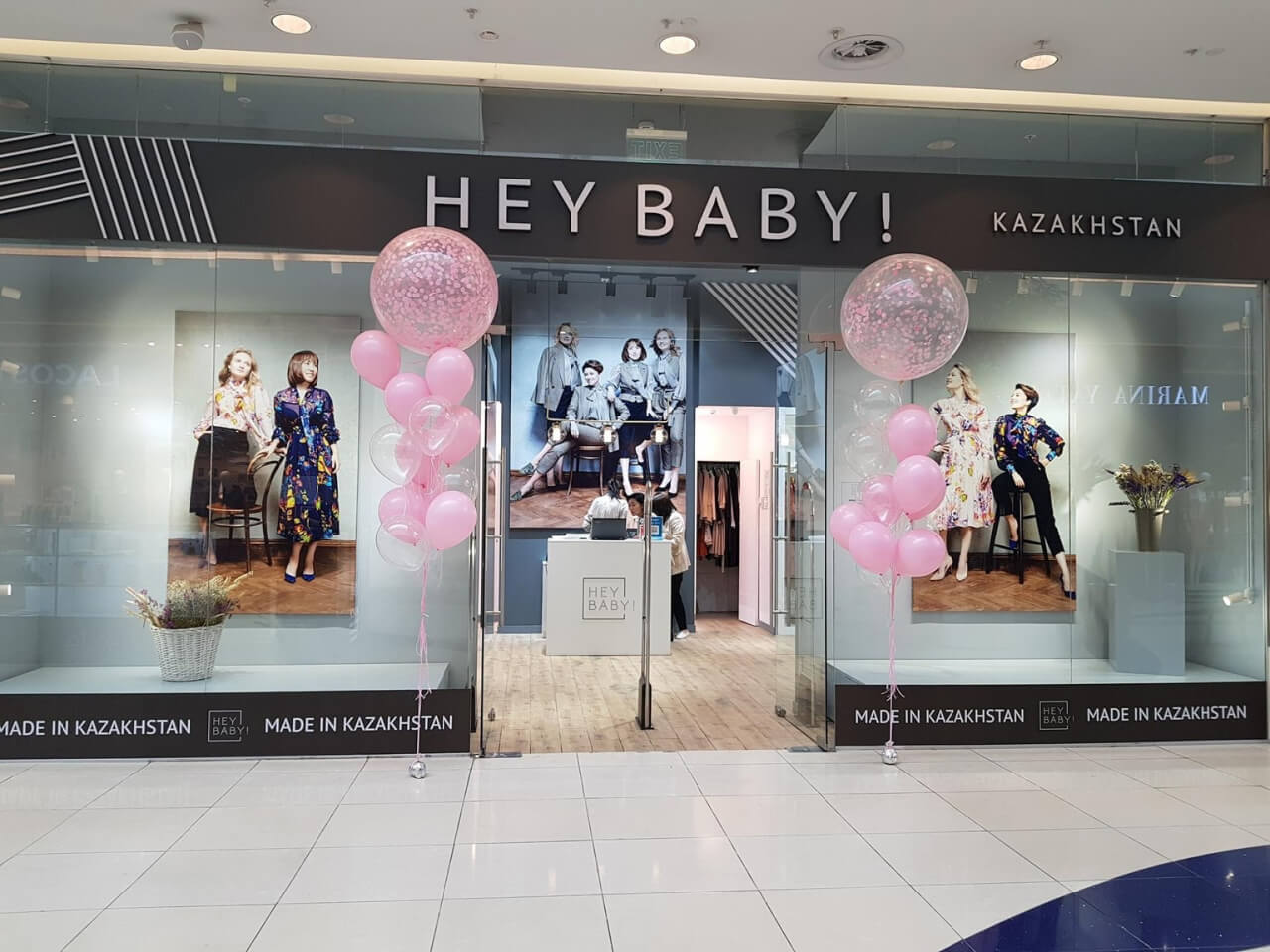
In 2018, we took a second loan to expand production. Experience has shown that sales in shopping centers bring much more revenue, so we opened a shop in MEGA mall in Almaty also.
The new location provided us with multiple growth, our turnover almost doubled in a year — from 80 million tenge (145 lakh rupees) in 2018 up to 142 million tenge (260 lakh rupees). In 2019, we become VAT payers. In Kazakhstan, VAT is 12% and is paid on the turnover if it exceeds 60 million tenge (110 lakh rupees) for 12 months.
Sales in two showrooms, on Lamoda, and in the online store brought the company 4 million tenge (731 000 rupees) per month, and after the opening of two stores in MEGA malls — 12 million (22 lakh rupees).
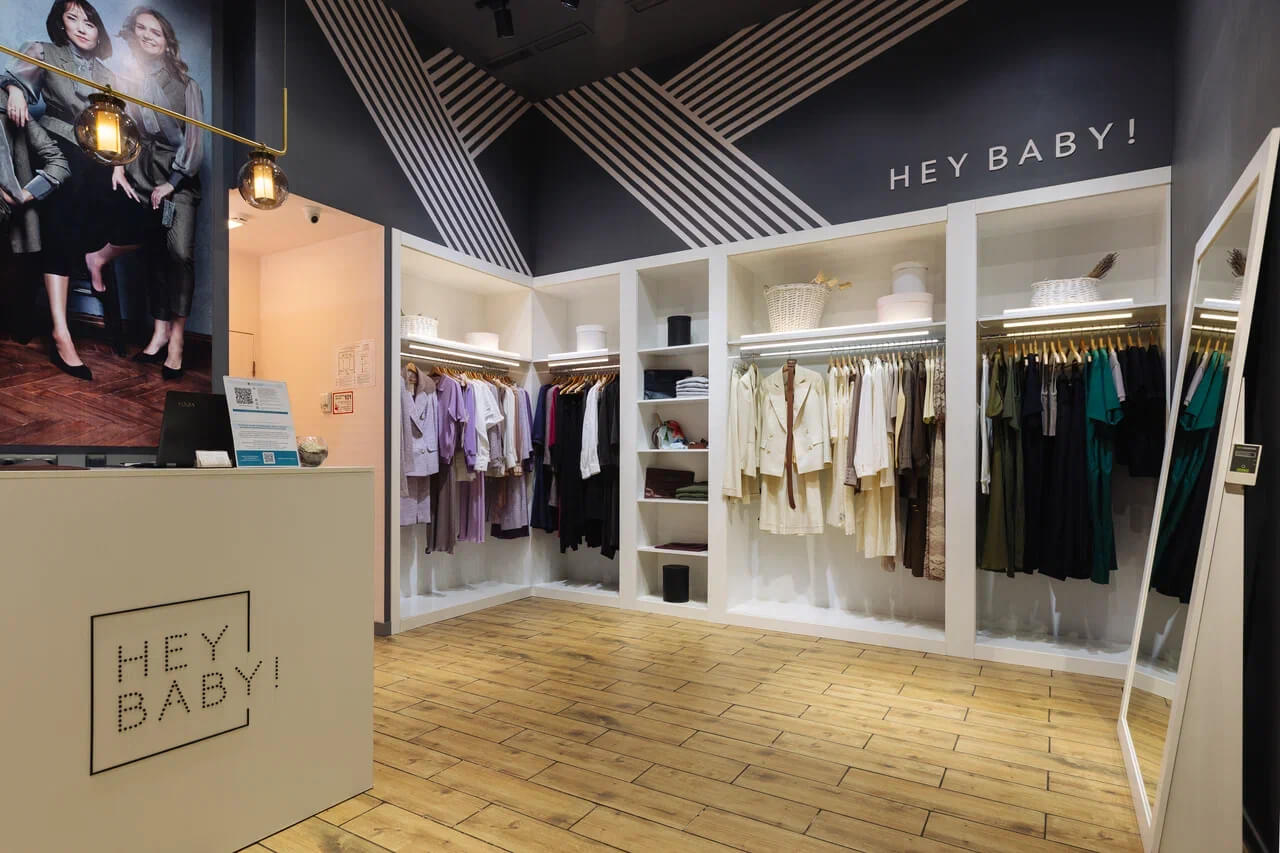
Manufacturing in Turkey and Almaty
Aliya and Inna understood that production had to be located abroad, as it would not be possible to produce goods in large numbers in Kazakhstan. They found a manufacturing facility in China. Part of the collection was sewn there. In 2021 they launched production in Turkey. So, 70% of the collection was sewn abroad (45% — in Turkey, 25% — in China), and 30% — in Almaty.
Inna: Three years ago we started outsourcing production abroad. We ordered knitwear production in China. In 2021, we started production in Turkey in a test mode. The quality standards of mass production in Turkey are different from what we are used to.
Aliya: Turks make average quality at an average price, and we want good quality at an average price. We argued with them quite a lot, and to alter or refine complex models here in Almaty.
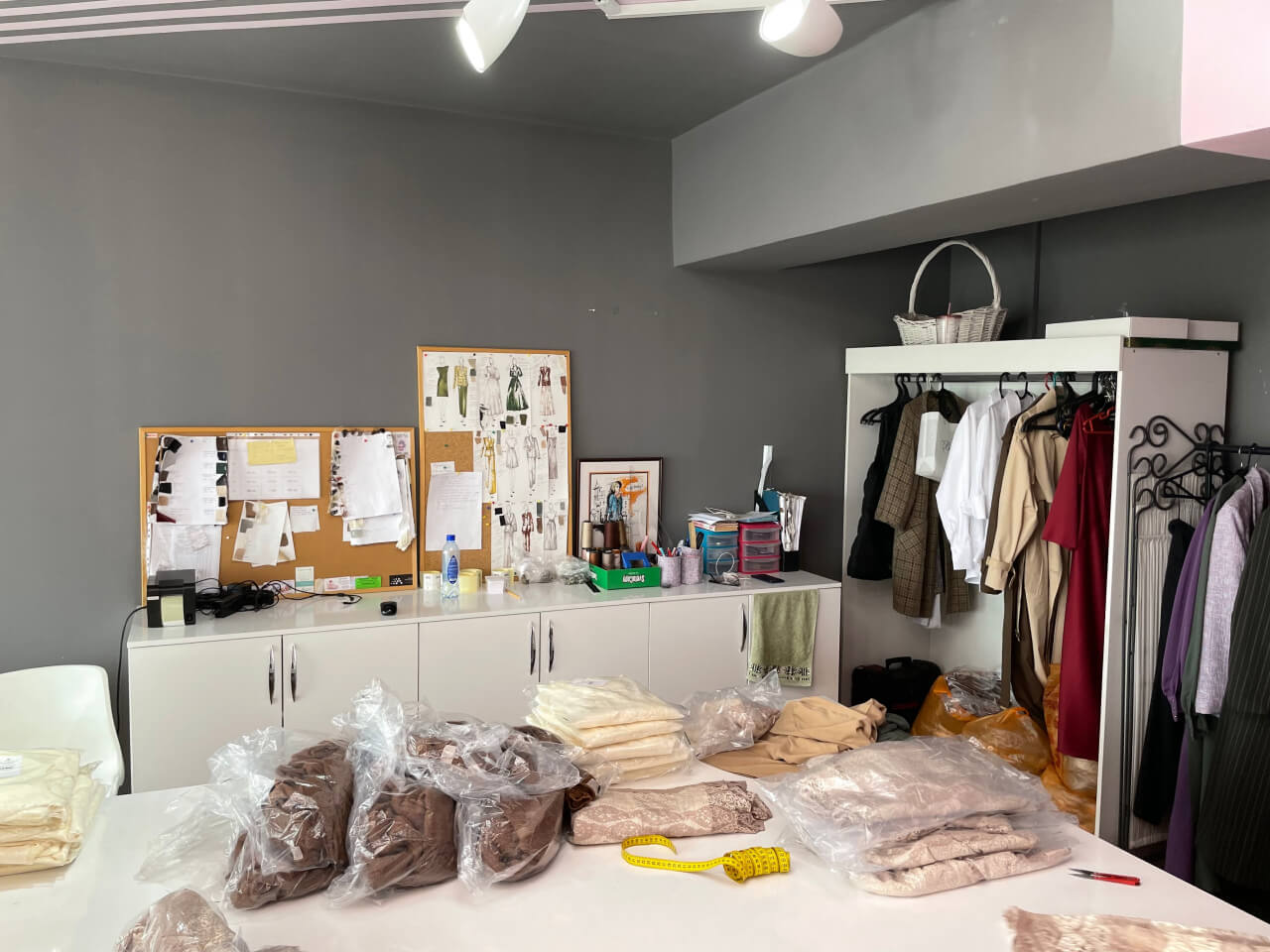
90% of Hey Baby! Clothing Sales are Offline
The vast majority of all sales happen in offline stores, rather than online. It’s hard for people to buy without fitting.
Inna: One day we decided to boost sales on our website and made discounts on online purchases. As a result, customers came to our stores, tried things on, and then placed an order on the site. All in all, the promotion failed.
After the campaign, we conducted a survey asking customers what stopped them from ordering clothes online. It turned out that most women cannot define their size, do not know how to measure themselves, and have no idea whether a particular style will suit them. It is very important not only to touch and try on apparel but also to personally consult with the seller. Customers even write to us by direct mail and give us advice.
Survival during the Covid-19 Pandemic & Additional Loans
Hey Baby! brand developed in difficult conditions: an unfavorable economy for this sector, devaluation of the tenge, and dependence on external suppliers. And then the coronavirus pandemic occurred. For six months the stores were closed. Later they didn’t work on weekends, and on weekdays only until 6 p.m.
However, the government paid minimum wages to employees, malls did not charge rent, and banks set vacations for loan repayments. Despite serious support, Hey Baby! brand had to take out a loan to pay its rent and wage debts. For six months there was no profit.
Aliya: But by 2021, we had recovered from the pandemic, and we were expecting a profit. Inna began to receive a salary two years ago, she lived on savings. And then, when success was so close in 2022, political issues took place.
In January our country was paralyzed due to internal conflict. In January we usually pay suppliers, it’s high time to create a new collection and start production. But this time our communications were blocked, and the banks were not working.
On February 25, we needed to pay our Turkish partners, and not only has the dollar risen, but we couldn’t buy it at all. It was impossible to convert tenge into dollars in the banks. As a result, we were forced to buy dollars at a crazy rate, just to pay the obligations, so as not to be late with the collection. As a result, we did not have time to prepare the spring-summer collection.
Kladana is a Complex Tool for Production Management & Detailed Analytics
Inna: Despite the crises, the company turnover continues to grow. We revised our assortment matrix and approach to preparing a collection, and we have learned how to produce more items and do it efficiently.
Kladana helps us launch new collections. We evaluate how efficient the previous one was — estimate the sell-through of each item, and analyze what could slow down the sales and why.
We find the best-selling goods and decide whether we are going to repeat them in the new season. Analytics with the help of Kladana is a handy thing: you think you know everything, but it turns out you don’t.
Aliya: We manage manufacturing in Kladana: create bills of materials and production operations, process sales & production orders, and even keep records of needles available in stock. We’ve got all info in Kladana — from a single piece of thread to each customer. We have a «guru» of Kladana, who is now testing our sales managers’ knowledge of the service — if they fail, they will be in trouble.
Once Kladana helped us catch an unscrupulous manager who attributed someone else’s sales to themselves. Kladana allows you to see the entire history of actions, so we warn employees about this in advance.
Ambitious Plans
Inna: 35 people are working at Hey Baby!, and there used to be three. When you get close to 40 people, you find yourself in a trap. You already have a demand for highly qualified personnel — you need commercial and financial directors. But these people are expensive, and the turnover is not yet that high. We get stuck in this trap, we have to do many things ourselves, and we make mistakes.
The pandemic has pushed us back a lot. In 2019, we reached the break-even point, and due to half-a-year closed stores in 2020, we were snowed under with debts.
Aliya: We plan to bring Hey Baby! apparel to every Kazakh woman’s closet. For now, we are not considering foreign markets, we have not yet covered entire Kazakhstan, for example, the west of the country.
There are a design bureau and a workshop in Almaty where we develop patterns and prototypes. In Almaty, we sew more complex, exclusive things. In China we make knitwear, and mass production is concentrated in Turkey.
